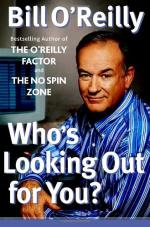
|
| Name: _________________________ | Period: ___________________ |
This test consists of 15 multiple choice questions and 5 short answer questions.
Multiple Choice Questions
1. How does Bill describe the United States?
(a) A country with need for improvement.
(b) The best country in the world.
(c) One of the best countries in the world.
(d) A leader in the world.
2. Based on Bill's analysis, how many networks had an overwhelmingly biased coverage featuring anti-war protesters?
(a) Two out of three.
(b) None.
(c) Three out of three.
(d) One out of three.
3. What option can be used as a go between for citizens and the police?
(a) School.
(b) Parents.
(c) Friends.
(d) Church.
4. What was the charge that Bill made when he petitioned the State Bar after the case?
(a) The defense lawyers intentionally misled the prosecution.
(b) The defense lawyers intentionally misled the jury.
(c) The defense lawyers unintentionally misled the prosecution.
(d) The defense lawyers unintentionally misled the jury.
5. What was the outcome of the case that Bill complained about?
(a) Twenty five years in prison.
(b) A life sentence.
(c) A death sentence.
(d) Jail time with no parole.
6. As Bill explains in Chapter 6, what is the problem with using a "world consensus"?
(a) It ignores many problems for over half of the other countries.
(b) It ignores many problems for less than half of the countries.
(c) It addresses too many problems that have nothing to do with America.
(d) It does not put America's best interest first.
7. Which of the following is not included in the list of things that Bill thinks can lead to mistakes?
(a) Drinking.
(b) Gambling.
(c) Sorrow.
(d) Insecurity.
8. Although people should think for themselves, how does Bill think they should ask for advice?
(a) They should rely on advice for most decisions.
(b) They should not shy away from asking for advice.
(c) They should never ask for advice.
(d) They should rarely ask for advice.
9. During the time of network bias, how many Americans supported the decision to go to war against Iraq?
(a) The views of Americans were not analyzed.
(b) A minority.
(c) The country was split.
(d) A majority.
10. Which of the following sayings is not included in the section covering some of Bill's mistakes?
(a) To err is human, to forgive is divine.
(b) Chaos always creates more chaos.
(c) Bad decisions lead to bad outcomes.
(d) Two wrongs don't make a right.
11. What type of evidence was presented at the trial in the case that Bill filed a complaint about?
(a) Hearsay.
(b) Eye witness.
(c) Circumstantial.
(d) None.
12. How does Bill describe Pope John Paul II's objections to the Iraq War?
(a) Expected.
(b) Uncharacteristic.
(c) Troubling.
(d) Confusing.
13. According to Bill, what happens to uncontrolled brutality?
(a) It never gets out of control.
(b) It sometimes gets out of control.
(c) It usually gets out of control.
(d) It always gets out of control.
14. What stand does Bill think the Catholic Church may not be willing to take?
(a) Defending freedom.
(b) Defending justice.
(c) Calling out ignorance.
(d) Calling out evil.
15. What is Bill's advice to minorities?
(a) Talk with the police more.
(b) Talk with the politicians more.
(c) Move to another neighborhood.
(d) Don't sweat the small stuff.
Short Answer Questions
1. What does Bill think people should strive for in Chapter 10?
2. When did Bill begin analyzing the network coverage of the Iraq War?
3. What is the title of the tenth Chapter of Who's Looking Out for You?
4. According to Bill, what makes it possible for a common man to achieve fame and success?
5. What was the result of the policies during the time Bill's grandfather worked with the police?
|
This section contains 620 words (approx. 3 pages at 300 words per page) |

|




